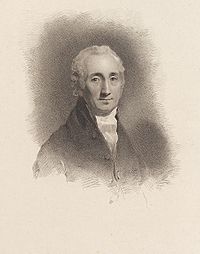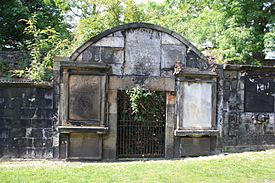Alexander Fraser Tytler, Lord Woodhouselee facts for kids
Alexander Fraser Tytler, Lord Woodhouselee FRSE (15 October 1747 – 5 January 1813) was a Scottish advocate, judge, writer and historian who was a Professor of Universal History, and Greek and Roman Antiquities at the University of Edinburgh.
Life
Tytler was born in the Old Town of Edinburgh, the eldest son of Ann Craig of Costerton (1722–1783) and her husband William Tytler of Woodhouselee (author of Inquiry into the Evidence against Mary Queen of Scots). He was educated at Edinburgh High School and Kensington Academy in London (1763/64), and then studied law at the University of Edinburgh, qualifying as an advocate in 1770.
In 1771 he made a tour of France with his cousin, James Ker of Blackshiels.
In 1773 he was living and working with his father, also an advocate, at Campbells Close on the Royal Mile.
In 1780 he was appointed joint professor of Civil History at the University of Edinburgh alongside Prof Pringle. He then moved to Browns Square. He became sole professor in 1786 on the death of Pringle.
In 1790 he became Judge Advocate of Scotland. In 1795 he became seriously ill, and could not attend court.
In 1802 he became a Lord of Session in the Scottish Courts, with the judicial title Lord Woodhouselee.
Tytler's other positions included Senator of the College of Justice and George Commissioner of Justiciary in Scotland. Tytler was a friend of Robert Burns, and prevailed upon him to remove lines from his poem "Tam o' Shanter" which were insulting to the legal and clerical professions.
In 1811 he retired from his role as Senator of the College of Justice his place being filled by David Williamson, Lord Balgray.
He died at his townhouse at 65 Princes Street in Edinburgh and was buried in Greyfriars Kirkyard. The vault lies on the west side of the section known as the Covenanter's Prison which is generally closed to public view.
Family
In 1776 he married Ann Fraser of Balnain. Their children included Patrick Fraser Tytler, traveller and historian, James Fraser Tytler, a lawyer, Alexander Fraser Tytler, Assistant Judge and author in Bengal, India, and William Fraser Tytler, a lawyer and historian.
Translation
Tytler wrote a treatise that is important in the history of translation theory, the Essay on the Principles of Translation (London, 1791). It has been argued in a 1975 book by Gan Kechao that Yan Fu's famous translator's dictum of fidelity, clarity and elegance came from Tytler.
Tytler said that translation should fully represent the 1) ideas and 2) style of the original and should 3) possess the ease of original composition.
Quotations on democracy
In his Lectures, Tytler expressed a critical view of democracy in general and representative democracies such as republics in particular. He believed that "a pure democracy is a chimera", and that "All government is essentially of the nature of a monarchy".
In discussing the Athenian democracy, after noting that a great number of the population were actually enslaved, he went on to say, "Nor were the superior classes in the actual enjoyment of a rational liberty and independence. They were perpetually divided into factions, which servilely ranked themselves under the banners of the contending demagogues; and these maintained their influence over their partisans by the most shameful corruption and bribery, of which the means were supplied alone by the plunder of the public money".
Speaking about the measure of freedom enjoyed by the people in a republic or democracy, Tytler wrote, "The people flatter themselves that they have the sovereign power. These are, in fact, words without meaning. It is true they elected governors; but how are these elections brought about? In every instance of election by the mass of a people—through the influence of those governors themselves, and by means the most opposite to a free and disinterested choice, by the basest corruption and bribery. But those governors once selected, where is the boasted freedom of the people? They must submit to their rule and control, with the same abandonment of their natural liberty, the freedom of their will, and the command of their actions, as if they were under the rule of a monarch".
Tytler dismisses the more optimistic vision of democracy by commentators such as Montesquieu as "nothing better than an Utopian theory, a splendid chimera, descriptive of a state of society that never did, and never could exist; a republic not of men, but of angels", for "While man is being instigated by the love of power—a passion visible in an infant, and common to us even with the inferior animals—he will seek personal superiority in preference to every matter of a general concern".
"Or at best, he will employ himself in advancing the public good, as the means of individual distinction and elevation: he will promote the interest of the state from the selfish but most useful passion of making himself considerable in that establishment which he labors to aggrandize. Such is the true picture of man as a political agent".
However, Tytler does admit that there are individual exceptions to the rule, and that he is ready to allow "that this form of government is the best adapted to produce, though not the most frequent, yet the most striking, examples of virtue in individuals", paradoxically because a "democratic government opposes more impediments to disinterested patriotism than any other form. To surmount these, a pitch of virtue is necessary which, in other situations, where the obstacles are less great and numerous, is not called in to exertion. The nature of a republican government gives to every member of the state an equal right to cherish views of ambition, and to aspire to the highest offices of the commonwealth; it gives to every individual of the same title with his fellows to aspire at the government of the whole".
Tytler believed that democratic forms of government such as those of Greece and Rome have a natural evolution from initial virtue toward eventual corruption and decline. In Greece, for example, Tytler argues that "the patriotic spirit and love of ingenious freedom ... became gradually corrupted as the nation advanced in power and splendour".
Tytler further states: "Patriotism always exists in the greatest degree in rude nations, and in an early period of society. Like all other affections and passions, it operates with the greatest force where it meets with the greatest difficulties ... but in a state of ease and safety, as if wanting its appropriate nourishment, it languishes and decays". ... "It is a law of nature to which no experience has ever furnished an exception, that the rising grandeur and opulence of a nation must be balanced by the decline of its heroic virtues".
Works
- (1771). Piscatory Eclogues, with other Poetical Miscellanies of Phinehas Fletcher.
- (1778). The Decisions of the Court of Sessions, from its First Institution to the Present Time, supplementary volumes (2nd, 3rd and 4th) to Lord Kames's Dictionary of Decisions.
- (1782). Plan and Outline of a Course of Lectures on Universal History.
- (1784). Essay on the Life and Character of Petrarch, with Translation of Seven Sonnets.
- (1788). Life and Writings of Dr John Gregory.
- (1791). Essay on the Principles of Translation.
- (1792). The Robbers: A Tragedy, translation of Schiller's Die Räuber.
- (1798). A Critical Examination of Mr. Whitaker's Course of Hannibal over the Alps.
- (1799). Ireland Profiting by Example, a political pamphlet.
- (1800). Essay on the Military Law and the Practice of Courts-Martial.
- (1801). Elements of General History, Ancient and Modern (an extended version of his 1782 lectures).
- (1801). Essay on Laura and Petrarch.
- (1807). Memoirs of the Life and Writings of the Honourable Henry Home of Kames.
See also
- Playfair cycle
- Translation theory
- Strauss–Howe generational theory
- Dynastic cycle, Chinese history
General:
- Cyclical theory
- Social cycle theory
- Societal collapse
- Anacyclosis



